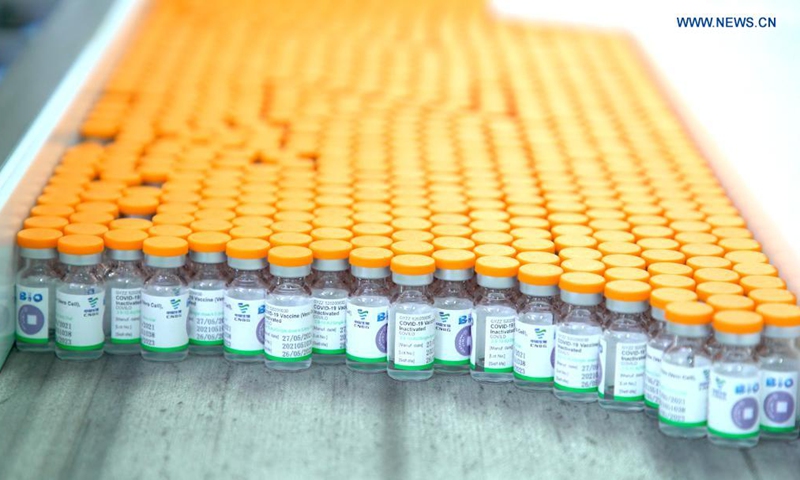
Photo taken on June 1, 2021 shows vials of the Sinopharm vaccine in Beijing, capital of China. China on Tuesday said the first batch of Chinese vaccines supplied to COVAX officially rolled off the production line, which is another important reflection of China's commitment to making its COVID-19 vaccines global public goods with concrete actions.Photo: Xinhua
Vaccinated people in China can choose to accept booster shots when available after herd immunity is built in the country, Zhang Yuntao, vice president and chief scientist of Sinopharm's subsidiary China National Biotec Group (CNBG), suggested while China's top epidemiologist Zhong Nanshan recently estimated the country could build herd immunity by vaccinating at least 80 percent of its population by the end of the year.
Zhang told the Global Times on Monday that studies and data obtained so far have shown that current CNBG inactivated vaccines are still effective in preventing the novel coronavirus, including mutations such as the Delta variant which is highly infectious.
The most effective method to protect people from the virus is still to vaccinate as many people as possible and as soon as possible, Zhang noted.
According to data from the National Health Commission (NHC), the Chinese mainland had administered more than 1.95 billion doses of COVID-19 vaccines as of Sunday. The commission previously revealed that more than 770 million Chinese mainland people have been vaccinated as of August 12.
At a forum on Friday, top epidemiologist Zhong Nanshan disclosed that China will vaccinate 80 percent of its population, which is about 1.4 billion, by the end of this year.
The Global Times estimated that about 798 million people have been fully vaccinated as of Monday on the mainland, about 57 percent of the mainland's population. A source close to the issue said the actual number is similar to the Global Times' calculations.
But the level of antibodies declines rapidly after vaccination, which is not only true for China's inactivated vaccines, but foreign ones, Zhang said, referring to a report of Israel's national health authority in late July, which said that the Pfizer/BioNTech's COVID-19 vaccine was just 39 percent effective in the country facing the dominant Delta variant.
According to a study by teams led by Zhong, two shots of Chinese inactivate vaccines showed
59 percent efficacy in preventing symptoms caused by the Delta variant during the outbreak in South China's Guangzhou in May and June.
After successfully building herd immunity, Chinese authorities can consider starting to provide boosters and the public can choose to accept boosters when available, Zhang said, noting that, in terms of booster shots, priority would also be given to some at-risk groups like people aged 60 and over, services and aviation industries employees.
Studies in the United Arab Emirates showed that a third shot of CNBG's inactivated vaccines in six months after the second one would boost the level of antibodies in recipients by 5-10 times, which would also help to protect the recipients from mutations like Delta, Zhang noted.
A
booster dose of CoronaVac, a COVID-19 vaccine developed by another Chinese producer Sinovac, administered in the elderly eight months after the second dose can induce a significant increase in neutralizing antibodies, Sinovac announced previously.




